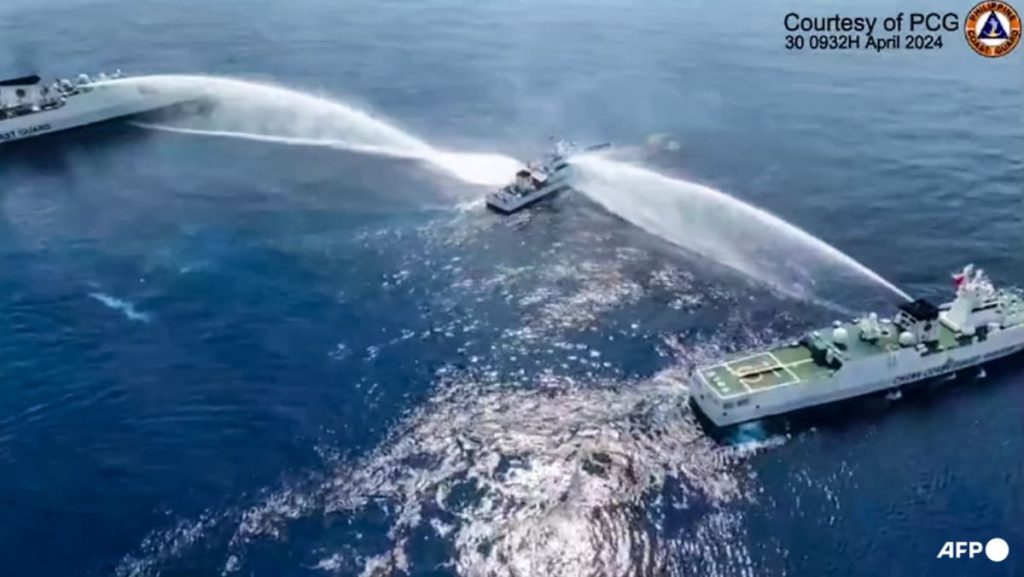t daily over the incident last week. The Philippines has accused China’s coast guard of carrying out “shadowing, blocking, dangerous maneuver, and radio challenges” against Philippine coast guard ships at Scarborough Shoal, a feature in the South China Sea where the two sides have rival territorial claims. “China’s maritime militia amassing Chinese vessels in the area shows their intent to further occupy features in the West Philippine Sea,” the Philippines said. “These actions are getting to the nerves of the Philippine government,” Philippine Defense Secretary Delfin Lorenzana said.
The United States and the Philippines have a mutual defense treaty that binds the two countries to support each other in case of an attack by a foreign country. In response to the recent incident, the US has reaffirmed its commitment to the Philippines, with Secretary of State Antony Blinken saying that any armed attack on Philippine forces would trigger the mutual defense obligations between the two countries. The US has been conducting freedom of navigation operations in the South China Sea to challenge China’s territorial claims, which are not recognized by international law. Austin’s statement condemning China’s actions is seen as a show of support for the Philippines and a warning to China about the consequences of its aggressive behavior.
China claims almost the entire South China Sea based on historical grounds, overlapping with the claims of other countries in the region like the Philippines, Vietnam, Malaysia, Brunei, and Taiwan. China has been building military facilities on artificial islands in the South China Sea, which has raised concerns among neighboring countries and the international community about China’s intentions in the region. The US has been strengthening its military presence in the region to counter China’s assertiveness, conducting joint military exercises with allies and partners and enhancing security cooperation with countries like the Philippines.
The South China Sea is a strategically important waterway through which a significant amount of global trade passes. It is also rich in natural resources like oil and gas, making it a valuable economic asset for the countries that claim control over its waters. The disputes in the region are a complex mix of historical grievances, territorial claims, and strategic interests, making it a potential flashpoint for conflict between countries with competing interests. The involvement of major powers like the US and China adds another layer of complexity to the situation, as their rivalry in the region has the potential to escalate tensions and increase the risk of confrontation.
The recent incident involving Philippine vessels and China’s coast guard is just the latest in a series of confrontations in the South China Sea. The area has been a hotspot of maritime disputes for years, with countries engaging in provocative actions to assert their claims over various features and resources in the region. China’s growing assertiveness in the South China Sea has led to increasing tensions with its neighbors and the US, as well as concerns about the risk of conflict in the region. The US has been trying to build a coalition of like-minded countries to counter China’s influence in the region and uphold the principles of a rules-based international order.
In conclusion, the situation in the South China Sea remains tense, with ongoing disputes and confrontations between countries with competing claims in the region. The recent incident involving Philippine vessels and China’s coast guard has highlighted the risks of escalation and the need for a diplomatic resolution to the disputes in the region. The US has reiterated its support for the Philippines and its commitment to upholding international law in the South China Sea, sending a clear message to China about the consequences of its aggressive behavior. The complex mix of historical grievances, territorial claims, and strategic interests in the region makes it a challenging issue to resolve, but dialogue and cooperation between countries will be essential to prevent further escalation and maintain peace and stability in the South China Sea.


